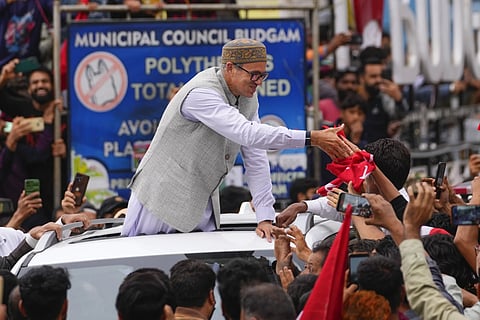

SRINAGAR: Leaders of Kashmir’s biggest political party were sworn into office Wednesday to run a largely powerless government after the first local election since the Centre stripped the region of its special status five years ago.
National Conference leader Omar Abdullah will be the region’s chief minister after his party won the most seats in the three-phased election. It has support from India’s main opposition Congress party, although Congress decided not to be a part of the new government for now.
The vote was Kashmir’s first in a decade and the first since Prime Minister Narendra Modi’s government scrapped the Muslim-majority region’s long-held semi-autonomy in 2019. The National Conference staunchly opposed the move, and its victory is seen as a referendum against the Modi government’s changes.
Lt. Gov. Manoj Sinha administered the oaths of office to Abdullah and the five members of his council of ministers in a ceremony under tight security at a lakeside venue in Srinagar. Some of India’s top opposition leaders, including Rahul Gandhi of the Congress party, attended.
However, there will be a limited transfer of power from New Delhi to the local government as Kashmir will remain a “union territory” — directly controlled by the Centre — with the Lok Sabha as its main legislator. Kashmir’s statehood would have to be restored for the new government to have powers similar to other states of India.
Kashmir’s last assembly election in 2014 brought to power Modi’s Bharatiya Janata Party, or BJP, which for the first time ruled in a coalition with the local Peoples Democratic Party. The government collapsed in 2018, after the BJP withdrew from the coalition and New Delhi took the region under its direct control.
A year later, the Centre downgraded and divided the former state into two centrally governed union territories, Ladakh and Jammu-Kashmir. The move — which largely resonated in India and among Modi supporters — was mostly opposed in Kashmir as an assault on its identity and autonomy amid fears that it would pave the way for demographic changes in the region.
Like on election days, authorities on Wednesday limited access of foreign media to the oath ceremony and denied press credentials to most journalists working with international media, including The Associated Press, without citing any reason.
In the recently concluded election, the National Conference won 42 seats, mainly from the Kashmir Valley, while the BJP secured 29 seats, all from Jammu. The Congress succeeded in six constituencies.
Experts say the new government, stripped of all the essential powers, would face a daunting task to fulfil its election promises against huge public expectations to resist the 2019 changes and the Central government’s tight control.
Praveen Donthi, senior analyst with the International Crisis Group, said the region’s political vacuum of the last few years will not vanish with the polls alone.
“The Modi government should build on it by restoring full statehood and empowering the government,” said Donthi. “Otherwise, it will intensify disaffection and is a set up for failure.”
Modi and his powerful home minister, Amit Shah, have repeatedly stated that the region’s statehood will be restored after the election, without specifying a timeline. However, they vowed to block any move aimed at undoing the 2019 changes but promised to help in the region’s economic development.
For the new chief minister, meanwhile, it’s going to be a tightrope walk.
“As a pro-India politician at the helm of this powerless administration, Omar Abdullah knows his limitations,” Donthi said. “He would be looking at his job as a buffer to moderate the worst instincts of New Delhi, but he would be clutching at straws.”